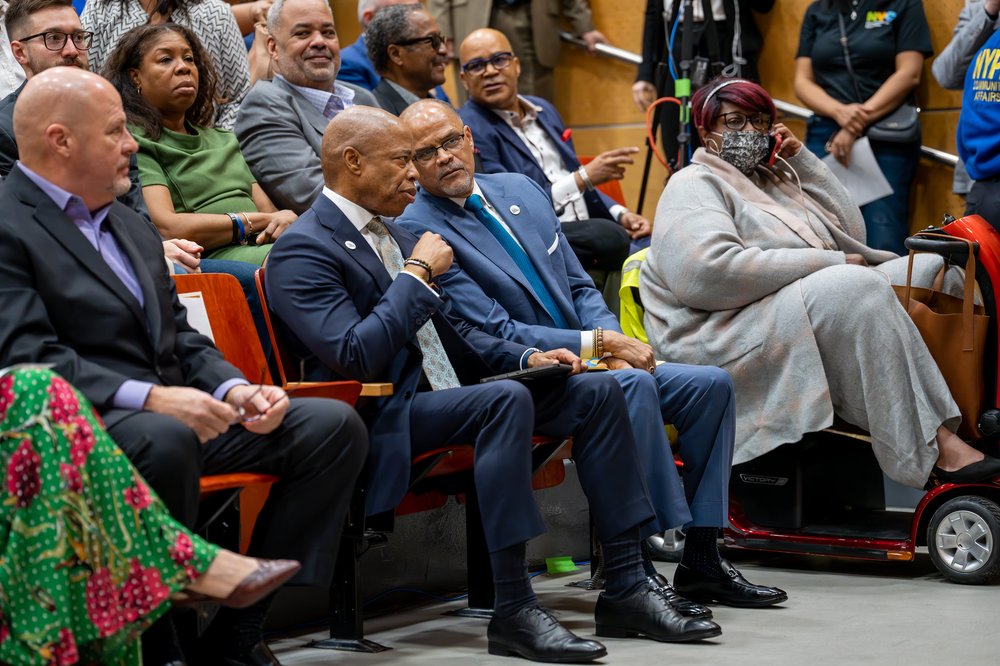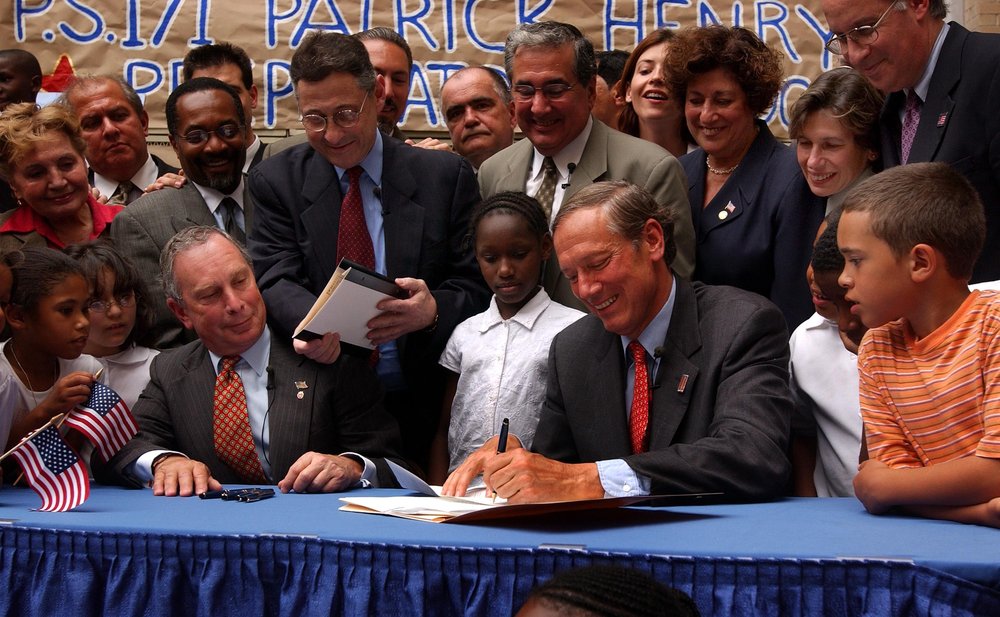Mayoral control of NYC schools up for debate again as Albany returns to session
Dec. 28, 2023, 5:01 a.m.
A primer on the high-stakes education topic entering the new year.

In the new year, state lawmakers will once again tackle the thorny question of whether New York City’s mayor can maintain control of the public school system.
Mayor Eric Adams reportedly ruffled feathers in Albany in 2021, resulting in only a two-year extension of mayoral control. Now, with Adams facing an FBI investigation and many parents and elected officials outraged over his budget cuts to education, there’s added suspense about how Albany will respond to his governance of schools.
Here’s a primer on how the relationship between mayors and Albany politicians has defined New York City’s school system.
The history of mayoral control
“The history of education in New York is really a history of cycles of centralization and decentralization,” said Ester Fuchs, professor of public affairs at Columbia University, and an advisor to the mayor within the Bloomberg Administration.
Before the late 1960s, the city’s board of education governed the schools.
Black and brown parents frustrated by segregation and inequality within the school system then led a fight for more local control, culminating in the Ocean-Hill Brownsville teachers’ strike. In response, the city introduced 32 community-based school boards to govern alongside the Board of Education.
But over the next several decades, many residents and city leaders began to criticize the boards for corruption, “obstruction, and meddling.”
In the 1990s, some other U.S. cities began consolidating governance of schools under the mayor as part of a broader reform movement.
“Mayoral control as a movement was a reaction to failing public schools,” Fuchs said.
Former Mayor Michael Bloomberg campaigned on transforming the schools by shifting accountability. Assailing the old school board as a “rinky dink candy store,” Bloomberg in 2002 persuaded lawmakers to grant him control of the schools to enact a series of controversial reforms, including closing some schools, breaking large schools into smaller ones, supporting charter schools, and transforming the admissions process.

But in recent years enthusiasm for mayoral control has been eroding as critics say the initiatives championed by mayors over the past two decades have not produced results. Chicago is in the process of returning to an elected school board, while Boston’s City Council recently called for an end of mayoral control, although that was vetoed.
Fuchs said mayoral control has at times been used as a “political football.”
Why is mayoral control up for renewal now?
Gov. Kathy Hochul originally proposed a four-year-extension of mayoral control after Adams took office in 2021 .
But lawmakers were reportedly put off when Adams initially sent Schools Chancellor David Banks to plead his case for the extension. Adams did eventually make trips to Albany to perform “tin cup” rituals seeking state-level support for various policy priorities, including mayoral control.
State Sen. John Liu, who chairs the New York City Education Committee, said the two-year extension was a compromise between proponents and critics of mayoral control.
In a surprise move, lawmakers also required that the Panel for Educational Policy expand to include more members to increase public input. The panel, an oversight board that is largely advisory but approves city Education Department contracts, grew from 13 to 23 members, but remains dominated by a majority appointed by the mayor. Critics say the panel is now more unwieldy while remaining a weak check on the mayor’s policies.
The two-year extension of mayoral control also required the state education department to evaluate mayoral control generally. That’s the process that’s underway now.
Liu hinted that some change is coming.
“I don’t think we’re going to revert back to the pre-2002 system of school governance,” Liu said. “But we have 20 years plus of history in New York City and we can learn from what other major school systems have already done.”
Public hearings on mayoral control will continue through January. Locations of hearing are listed here. The current law extends mayoral control through the end of June.
Albany legislators are expected to weigh the matter in the session beginning next month.
- heading
- Upcoming mayoral control hearings
- image
- image
- None
- caption
- body
The state education department is holding public hearings from 6 p.m. to 9 p.m. in each borough. Here are upcoming dates:
Jan. 11
Boys and Girls High School
1700 Fulton Street
Brooklyn, NY 11213
Jan. 18
Martin Luther King Jr. Educational Complex
122 Amsterdam Avenue
New York, NY 10023
Jan. 29
New Dorp High School
465 New Dorp Lane
Staten Island, NY 10306
The argument for mayoral control
At the first public hearing in the Bronx on Dec. 5, Banks spoke in support of mayoral control, saying the previous system with the Board of Education failed students.
“Mayoral accountability, in contrast, is as close as we can get to a system that is the most manageable, least politicized, and most impactful,” he said. “It unifies the boroughs and centralizes government to cut through the noise of politics. At the end of the day, there needs to be someone in charge who can get stuff done.”
In a statement to Gothamist, Bronx State Sen. Luis Sepulveda said mayoral control has paved the way for crucial initiatives, including “new curricula rooted in the science of reading and, as evidenced by Project Open Arms, allowed the City to respond to the migrant crises expeditiously,” he said. “The previous structure was too fragmented and would not have allowed that.”
This month, the community education council representing District 26 in Queens passed a resolution urging lawmakers to continue mayoral control, citing corruption and patronage in the previous structure. But it urged lawmakers to streamline and reform the Panel for Education Policy to increase parent representation, and create more mechanisms for parents to evaluate the chancellor.
Kathryn Wylde, president of the Partnership for New York City and a staunch supporter of mayoral control, said the current structure is much more efficient than the previous one. “Education policy and budget decisions are no longer split between City Hall and a Board of Education, which means less contention and more effective allocation of resources,” she said.
The argument against mayoral control
Critics of mayoral control have dominated the public hearings so far.
At the Dec. 5 hearing in the Bronx, Kathleen Brown, a teacher in District 11, said mayoral control is too “top down,” removed from the reality on the ground and aloof. “Our expertise should be valued and play an active role in shaping curriculum,” she said.
Some blasted the mayor’s budget cuts to education. The mayor announced a $547 million cut in November, with plans to cut more in the coming year. Others worried about inconsistency as priorities shift from one administration to the next.
“We have to ask ourselves if our schools are in better shape now than they were in 2002. … They’re not,” Rich Sherman, an educator in the South Bronx, said.
He said the system has ballooned with bureaucrats and administrators, while classes remain too large, and some schools go without gyms and auditoriums. As an example of how removed the mayor is from students, he noted how many of the vegan Friday lunches end up in the trash.
Speakers also criticized the Panel for Education Policy as toothless.
“My experience has been that the PEP, with a supermajority of mayoral appointees, working in collusion with the mayor and chancellor, routinely ignores the voices of the community,” said Thomas Shepard, a member of the Panel for Education Policy and parent.
Outside of the hearings, critics have also made their concerns known.
Brooklyn State Sen. Jabari Brisport, a former teacher, said he always felt mayoral control created too much distance between the people in charge and the policies on the ground. He said constituents are also concerned about budget cuts and “continued attacks on education funding.”
“There are just wider questions around whether a mayor who has shown such disregard for public schools should have control over policy decisions,” he said.
United Federation of Teachers President Michael Mulgrew said the union has “always” been against mayoral control.
“Every mayor starts using the school system for their political purposes,” said Mulgrew, who just announced a lawsuit against the mayor over the budget cuts.
He said he’d prefer to see community education councils with a “real voice,” a Panel for Education Policy that’s not “beholden” to the mayor, and a process where the mayor would choose from a list of candidates for schools chancellor compiled by education stakeholders.
This article was corrected to more accurately reflect the length of mayoral control extensions, and the number of members of the Panel for Educational Policy.